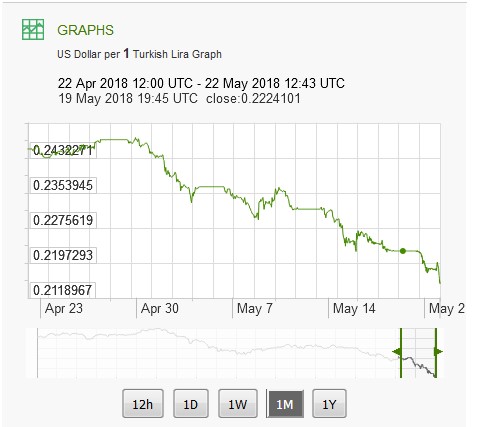Despite living in a middle-income region, citizens of the Middle East are some of the world's most financially excluded. Only 15 percent of the population has access to formal banking services, ranking as the lowest among developing regions and appallingly low compared to 94 percent of the adult population holding an account with a financial institution in high-income countries.
Yet, financial inclusion is a key ingredient to reducing poverty and fostering economic growth. An efficient financial sector improves capital allocation, stimulates savings and helps sustain high levels of economic growth.
Years of soft oil prices and constant political uprisings have made economic diversification and liberation in MENA (Middle East and North Africa) a must-have if the region is to escape its unfortunate history of shallow and inconsistent growth.
Crypto to the Rescue?
Turkish Lira 30-Day Change

(Click to enlarge)
Source: X-Rates
Luckily, that might be about to change, thanks to a new fintech revolution that's taking off in the region. And, it's not about the usual open banking and digital payment systems that are currently all the rage.
Over the past few months, cryptocurrency exchanges have been receiving a deluge of traffic from the Middle East as a regional currency crisis continues to bite. As much as 30 percent of crypto exchange traffic now comes from the region, a sharp contrast from nearly zero a year ago as recalcitrant citizens defied crypto bans by their governments and look to escape the widespread ravages of heavy currency devaluations.
Most MENA countries and Arab Spring economies have highly unstable currencies due to the region's high levels of geopolitical tensions, corrupt regimes, opaque economies and runaway inflation.
Not surprisingly, currencies in volatile regions like Syria are teetering on the brink of collapse with the Syrian pound having lost more than 90 percent of its value over the past couple of years amid constant threats of missile strikes by the U.S. and its allies. Related: Iran Looks To Bitcoin As Rial Tumbles
Meanwhile, its neighbors are not faring much better, with most currencies in the region in a freefall. The Iranian rial has lost more than a third of its value over the past eight months; the Egyptian pound has tanked 63 percent over the past five years while the Turkish lira is in meltdown after losing 15 percent over the past 30 days.
By shifting their wealth and savings from combustible fiat currencies to cryptocurrencies like bitcoin, the Middle Eastern community is demonstrating a complete loss of faith in their governments given how volatile cryptos themselves can be.
New Euro of the Arab World
The U.S. dollar and the euro stand out as the world's only truly global and regional currencies, respectively. But the Arab world could soon have the region's first regional currency--in crypto nonetheless.
The newly launched World Coin Network (WCN) is being billed as the future of Middle East cryptocurrencies. Sharing the popular ERC20 Ethereum platform with dozens of other tokens, WCN is meant to become a unified currency that can be used across all the Middle East.
But WCN is much more than just another bitcoin look-alike--it's also meant to be a lending platform that will serve hundreds of millions of unbanked people with no access to credit facilities. Further, WCN plans to build partnerships and networks with ecommerce companies to facilitate its use in digital transactions.
WCN is looking to fill the gaping financial hole that the region's governments have been ignoring. That's just another demonstration that crypto might end up having its biggest impact not in the developed economies but in disadvantaged regions like the Middle East, Central Europe, Asia and Africa.
By Alex Kimani for Safehaven.com
More Top Reads From Safehaven.com:
















